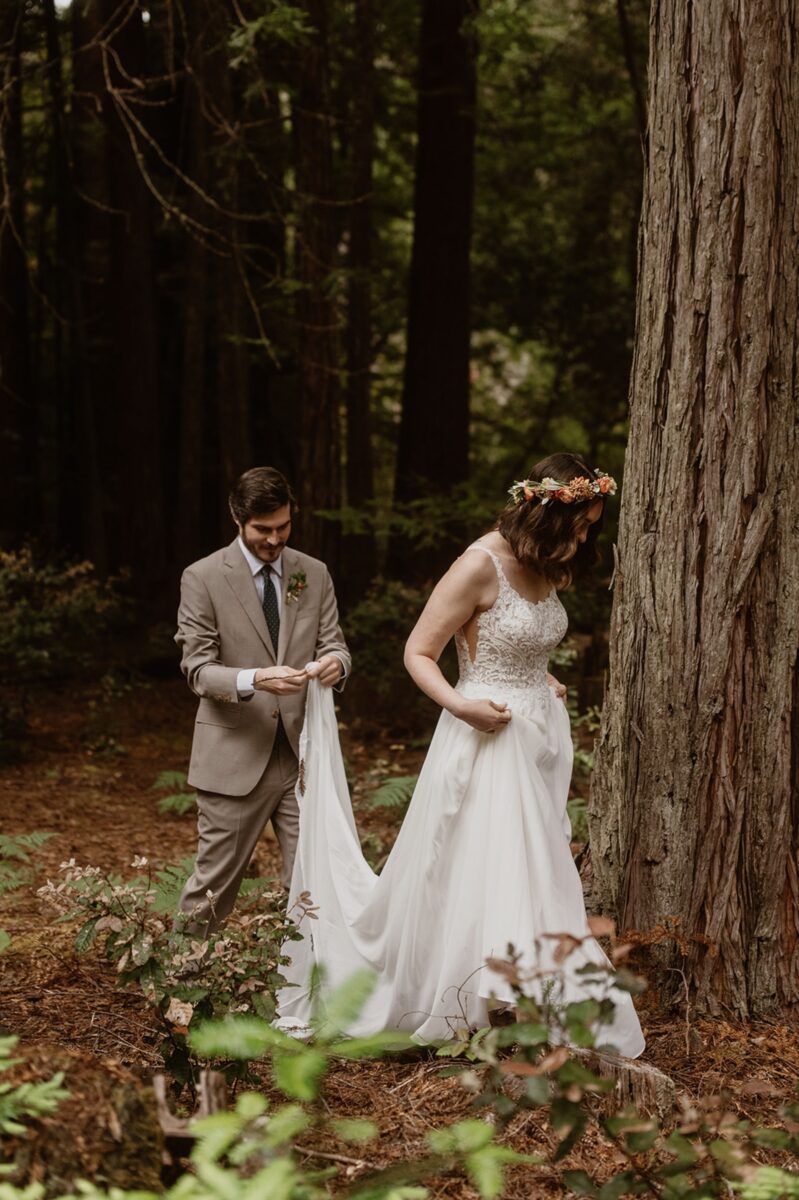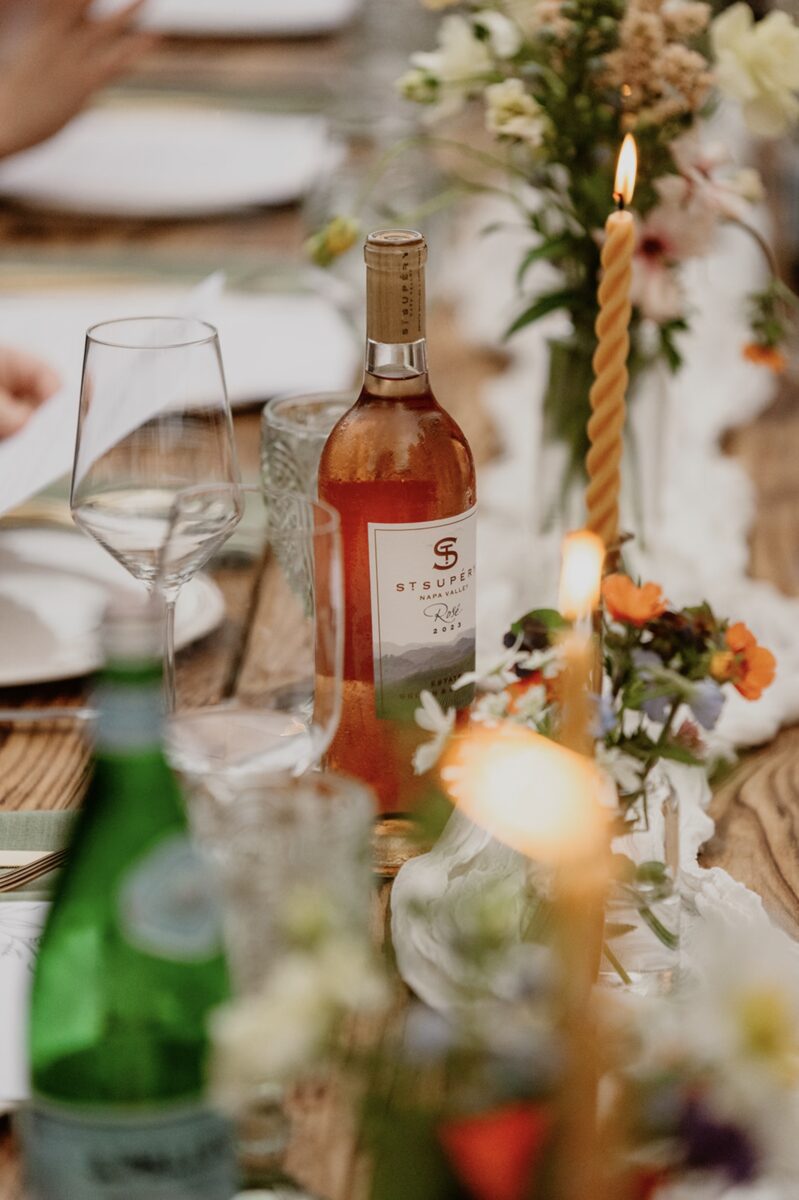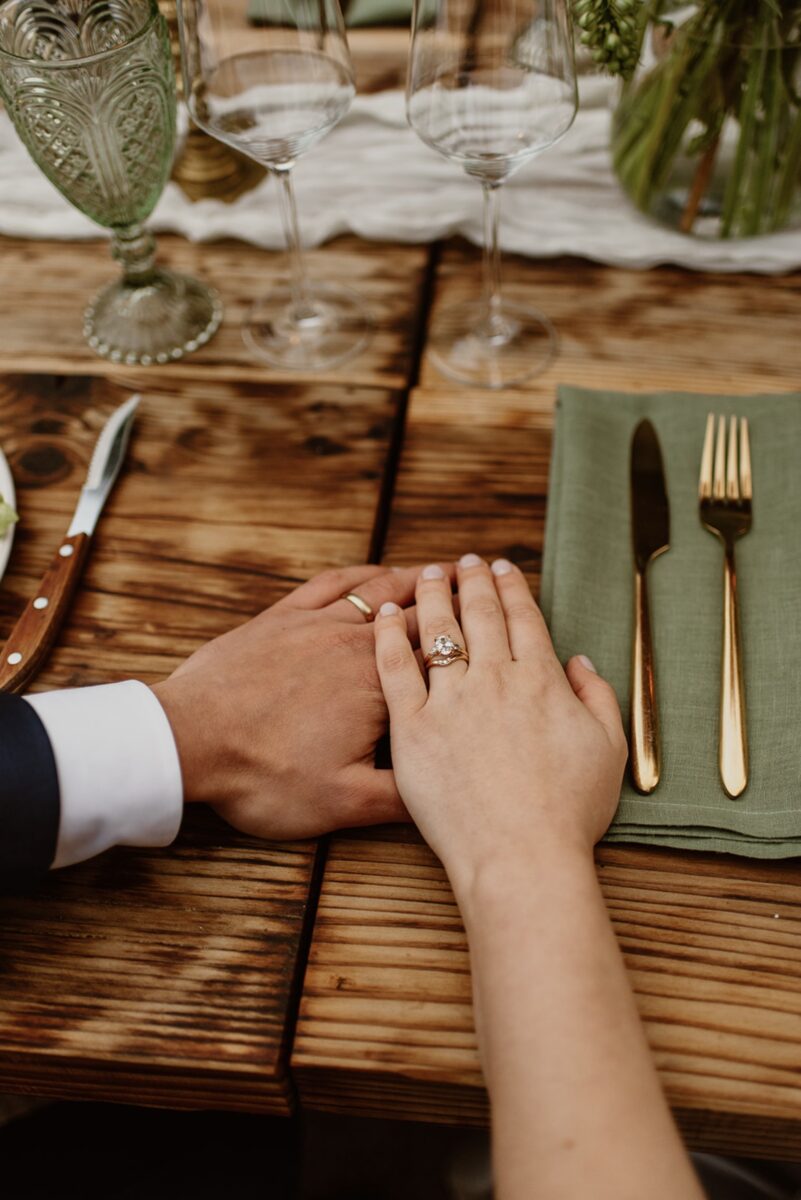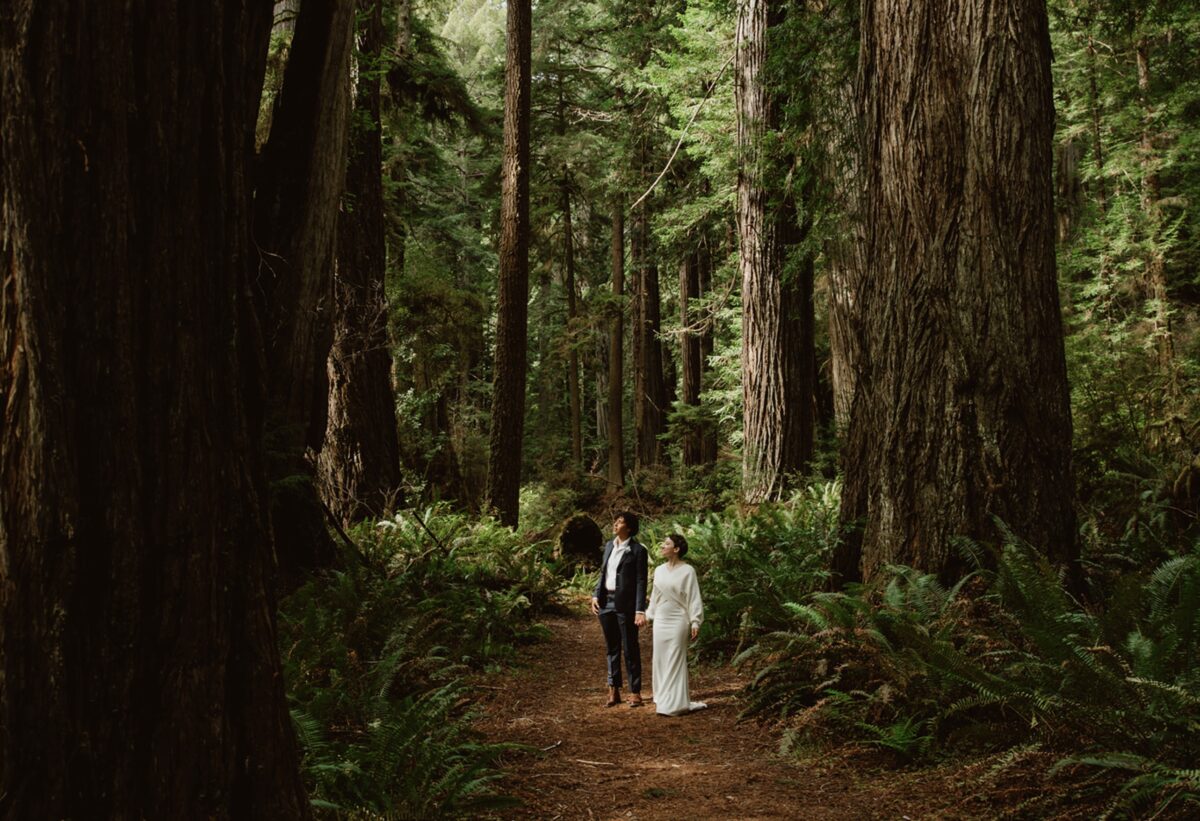So you’ve decided to elope.
You’ve chosen a wedding day that’s intimate, intentional, deeply you. But there’s one thing that keeps tugging at you: how the hell do I tell my family we’re eloping?
I get it. This part can feel harder than planning the entire day. Because no matter how clear your vision is, it’s still wrapped up in a whole lot of emotional weight: expectations, traditions, old family patterns, and that little voice in your head wondering if someone will take it personally.
This post is meant to offer emotional elopement planning support for the people who already know eloping is right for them. Because here’s what I’ve learned after helping couples through this conversation: it’s not about perfect words—it’s about speaking with love and clarity.
What You’ll Find in This Guide
- Why telling your family you’re eloping can feel so hard
- Supportive, real-world scripts to ease the conversation
- Ideas for including family in your elopement
- My personal story & a client example for reassurance
- A loving reframe to anchor your decision

The Short Answer: You Can Elope and Keep Your Integrity Intact
You can speak your truth without burning bridges. You can honor your family without letting them steer your day.
This isn’t about pleasing everyone. It’s about sharing something meaningful with care—and trusting that those who love you will come around, even if it takes time.
Let’s talk about how to announce an elopement with compassion and clarity, in ways that honor both your joy and your people.
Why Telling Family About Your Elopement Feels So Difficult
Most of us weren’t taught how to choose ourselves without guilt (if you’re a chronic people-pleaser, you know exactly what I mean).
We’ve been conditioned to think of weddings as family reunions, milestones where everyone gets a say and an invitation. So when you step outside that script, it can feel like you’re breaking some unspoken social contract.
Add in the pressure to “make everyone happy,” and it’s no wonder your stomach does flips every time you imagine the conversation.
But here’s what I want you to hear, as someone who’s helped dozens of couples (and lived this firsthand):
Choosing a wedding day that reflects your relationship isn’t selfish—it’s intentional.
You are allowed to do this differently. You are allowed to feel good about it. (If you don’t feel good about how your wedding planning is shaping up, I recommend questioning that and looking for ways to do it differently.)

How to Tell Your Family You’re Eloping: Scripts That Actually Work
You don’t have to (and shouldn’t) explain yourself into exhaustion. But you can offer your family a window into your why.
Here are a few ways to do that with both kindness and clarity:
If you’re announcing the decision clearly and firmly:
Say this: “We’ve decided to elope—just the two of us—because we really want to start our marriage in a way that feels grounded and private. It’s not about leaving anyone out. It’s about starting this chapter in a way that feels most aligned for us.”
Why it helps: This frames your choice as intentional, not reactive. It softens the exclusion by emphasizing presence and meaning.
If you want to offer space for conversation without inviting debate:
Say this: “I know this might feel surprising or even disappointing at first, and we get that. We’ve thought a lot about what we want for this day, and this is what feels right. We’d love to share more with you if you’re open to hearing it.”
Why it helps: You’re acknowledging their feelings without compromising your boundaries. You’re offering dialogue, not debate.
If you want to affirm connection even without physical presence:
Say this: “You mean so much to us, and even though you won’t be there physically, we’re thinking of meaningful ways to include you. Whether it’s writing letters, sharing photos, or FaceTiming after, we still want you to feel part of our story.”
Why it helps: You’re gently reminding them that love isn’t only shown in person—and that they’re still woven into this milestone.
If you need to hold a clear boundary around involvement:
Say this: “We’ve made a decision that’s deeply personal to our relationship. While we know it might not be what you envisioned, we’re hoping you can trust that we’ve thought this through with care and that we’re asking for your support as we start this new chapter.”
Why it helps: It draws a firm line while softening the edge. This is for those situations where guilt or pressure is heavy.
If they ask why you can’t just have a small wedding instead:
Say this: “We understand the difference might seem small, but for us, the intimacy and intention of an elopement feels like the truest way to celebrate our commitment. It’s not about the size—it’s about the energy and focus we want for our day.”
Why it helps: This acknowledges their suggestion without dismissing it, while clearly articulating that your choice is about quality of experience, not just logistics.
When to Have This Conversation
Generally, 3-6 months before your elopement gives family time to process without opening the door to months of negotiation. Too early and you might face ongoing pressure to change your mind. Too late and they may feel blindsided.
Consider your family’s communication style when choosing timing. If they’re processors who need time to adjust to new ideas, lean toward the earlier end. If they tend to offer lots of opinions and suggestions, you might prefer the later end to protect your planning peace. You know your family best. Trust your instincts about what timing will serve both your relationship and theirs.


Four Ways to Include Family in Your Elopement Without Losing Your Vision
Not everyone will understand at first—and that’s okay. But if you want to create small bridges of inclusion, here are a few ways to do it that don’t dilute your day:
- Write handwritten letters to your parents or grandparents and have them read it before or after your ceremony.
- Include heirlooms—like a piece of jewelry, fabric, or a recipe—as subtle nods to family legacy.
- Ask for advice or stories beforehand—not as permission, but as a way to gather wisdom and make them feel seen.
- Share your gallery intentionally—you don’t owe everyone everything, but a curated glimpse can go a long way. (One of my couples who eloped without any guests later told me that doing this helped their loved ones feel included)
My Wedding Story: When It Was Not Met With Cheers
When I think back to 2019 when my husband and I started planning our 18-guest wedding, I most remember feeling nervous about telling my parents that it wouldn’t involve the traditional extended-family guest list. It wasn’t a total shock, but still—there was real disappointment on their end. A lot of “Are you sure?” and “It would really mean a lot to me…” energy.
It stung. Not because I doubted our decision, but because I wanted them to see the vision we saw: the quiet woods, the relief of an intimate day that was ours. A celebration that wasn’t a performance in front of family members we only saw a handful of times a year (if that) and weren’t close with. Meaningful time to spend 1:1 with our innermost circle of people.
We held our boundary gently but firmly. And eventually, when we reached the big day, they understood. They saw the joy. They felt our peace. Now, looking back, they’ve told me they get it, and that our wedding was exactly right and perfect the way it was.
On the day of, our collective presence was the proof: they could feel our joy for themselves, and that freed them to simply celebrate with us.
(If this is hitting close to home and you want someone to walk you through this—reach out anytime.)
If you’re in that moment right now—I want you to know this: it gets lighter. You’re not alone. And you’re allowed to protect the peace you’ve worked so hard to create.
In case it’s helpful, I’d love to offer a quote from Glennon Doyle that I kept as my mental lighthouse during that time of our wedding planning:
“Every time you’re given a choice between disappointing someone else and disappointing yourself, your duty is to disappoint that someone else. Your job throughout your entire life is to disappoint as many people as it takes to avoid disappointing yourself.”
A Real-World Example From One of My Couples
A couple I worked with recently found themselves stuck between two important groups: family and friends. They didn’t want a crowd—but they didn’t want to leave anyone out, either.
We talked it through, and they landed on something simple and meaningful: their wedding day was for family only—15 people, meaningful connection, and lots of joy. The next day, they hosted a laid-back backyard hang with their friends: pizza, lawn games (you bet croquet was involved), zero pressure.
It wasn’t a “reception.” It was a celebration that reflected them. Two different spaces, both held with intention.
I offer this not as a prescription, but a reminder: there are so many ways to make this yours. And the right one will always be the one that feels most aligned.



How to Handle Family Reactions to Your Elopement Plans
Q: What if they threaten not to come to future events or cut us off?
This is manipulation, not love. While it’s painful, you can’t control their reaction—only your own response. Stay grounded in your truth and trust that time often softens these reactions.
Q: Should we give them advance notice or just announce it after?
Both approaches work. Advance notice allows for processing time but may invite more opinions. Post-elopement announcements protect your planning peace but may feel more shocking. Choose based on your family dynamics and your own emotional capacity.
Q: What if they keep bringing it up and trying to change our minds?
Set a gentle but firm boundary: “We’ve made our decision and we’re excited about it. I’d love to talk about other ways you can be part of our celebration, but the elopement plan isn’t up for discussion.” Then redirect the conversation or take a break if needed.
Q: How do we handle guilt trips or emotional manipulation?
Remember that their disappointment, while real, doesn’t require you to change your plans. You can acknowledge their feelings (“I understand you’re disappointed”) without taking responsibility for fixing them. Their emotions are valid, but they’re not your responsibility to manage (promise).
Q: What if different family members react differently?
This is totally normal. Some may be supportive immediately, others might need time to process, and some may never fully understand—and that’s okay. Focus your energy on the relationships that feel reciprocal and supportive rather than trying to bring everyone to the same place.
Q: Should we explain our reasons in detail?
Share what feels authentic to you, but avoid over-explaining or justifying repeatedly. A simple “This feels most true to who we are as a couple” is often more powerful than a lengthy defense. The more you explain, the more it can sound like you’re seeking permission.
Reframing Your Elopement Decision: You’re Not Hiding, You’re Honoring
Let’s say it out loud, just in case you need to hear it again:
You are not running away. You are moving toward something.
Toward presence, clarity, and an experience that mirrors your relationship—not someone else’s (or society’s) idea of it.
The people who matter will see that in time. And even if they don’t right away, you get to trust yourself and know what’s best for your relationship (because you do).
Ready to Plan a Day That’s Truly Yours?
If you’re feeling stuck on how to navigate family conversations (or any other part of elopement planning) I’m here to help. As someone who’s walked this path personally and professionally, I can offer both emotional support and practical guidance.
Ready to plan an elopement that feels authentic to you? Let’s start the conversation.